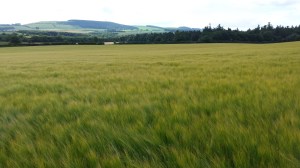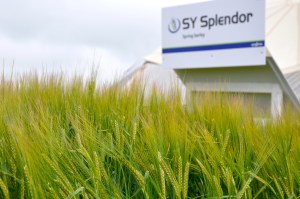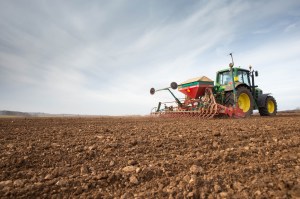Written by CPM Magazine from CPM Magazine
Download PDF
In an environment where no one is completely cushioned from volatility, it’s never been more important to select varieties to better manage risk. CPM takes a look at decision-making for the spring barley crop for a more certain outcome.
By Melanie Jenkins
With volatility in mind, having a range of crops which spread the workload at drilling and harvest and are destined for different markets is bound to spread risk, says Mike Thornton of Procam. He believes the first thing to consider with spring barley varieties is to make sure there’s market access.

Mike Thornton believes the first thing to consider with spring barley varieties is to make sure there’s market access.
“The end users of spring barley usually want something specific which can make for a conservative market. Plus, when growers find what they like they tend to stick with it, which can mean innovation with the crop can be restricted. But Laureate has pushed things on – the variety has end user acceptance, so you can grow it and be reasonably sure you won’t see many claims or rejections, taking the headache out of growing spring barley.”
As a tool to manage volatility, Mike feels the variety offers several potential market outlets and so can be grown in more areas of the country. “Varieties with the possibility of more than one home means you don’t have to just grow a feed variety, removing you from the hiccoughs, such as end price volatility and risks associated with that.”
According to Kathryn Hamlen of Syngenta, the breeder of Laureate, the aim is to produce varieties that suit both the malt distilling and brewing markets in the UK, but they are trialled across Europe to open up opportunities for export as well.
“This means that varieties must be both stable and consistent in the field but also when being malted. Our varieties have to perform for the end users as well as the growers,” she says.

Laureate could be a tool to manage volatility as the variety offers several potential market outlets and so can be grown in more areas of the country.
Mike also believes it’s important to consider whether a few extra percentage points in yield is worth the risk compared with dependability. “People often select varieties for the extra yield potential, but I’m not always convinced this is the right thing as different weather conditions can quickly knock off that possibility. Whereas other traits, like later maturity or better standing power, may have helped more.
“Remember that the scores on the AHDB Recommended List are a variety’s potential. So also think about your workload and how quickly you can get on to spray, if necessary,” he adds.
Volatile weather conditions are one of the challenges we’re very aware of, says Kathryn. “Conditions have been very extreme over the past couple of years and there’s been a shorter window to get spring barley drilled because it has been so dry. As breeders, this is something we’re very conscious of and the company is actively looking for varieties that can perform in different climates as well as consistently with differing weather patterns.”
The three years of official RL trials currently operated in the UK means varieties can be faced with very different seasons during this period, she explains. “Before we get plants to the registration phase, we look at their development in different locations, environments and weather conditions. They are trialled across our wide European and UK network which allows us to determine their environmental adaptability as well.”

According to Kathryn Hamlen, the aim is to produce varieties that suit both the malt distilling and brewing markets in the UK.
But volatile weather conditions aren’t the only challenge growers are faced with, they’re also having to contend with some of the highest input costs ever experienced. “When growers are faced with a year of high prices, like nitrogen and chemical inputs, their risks are greater, so having consistent performance is important in any crop,” says Mike. “Laureate has been around for a few years, so it’s proven on farm.”
The price of N is affecting everybody at the moment, adds Kathryn. “We have looked extensively at varieties in different N programmes but are now conducting further trials looking at how it affects both malt distilling and brewing quality.
“Obviously, the aim is for under 1.65% N for malt distilling and between 1.6% and 1.75% for domestic brewing, so we’re looking at higher N rates and also at breaking points, with applications ranging from zero N up to 200kgN/ha. This is so we can identify what the optimum application rate for yield is, as well as hitting the right N levels for the specific market.”
“But what we have also seen is that once you go past a certain application quantity in trials, there’s no longer a yield increase and the grain N just keeps getting higher and higher. So putting too much N on doesn’t result in a win-win situation.”
This is where varieties such as Laureate are advantageous. “The variety doesn’t require too much N,” says Kathryn. “It’s also a high tillering variety that has relatively small ears compared with other varieties that came before it, and this is what we believe makes it so consistent.
“In poorer years where varieties might lose a tiller, high tillering varieties can retain yield. But if yield is built into the ear, losing one tiller is a big deal.”
Mike advises that spring barley wants almost all of its nutrition at once because of its rapid development. “Make sure your soil analysis is up to date – for both macro and micronutrients. Lots of spring barley is grown on high pH soils where manganese, copper and zinc might be locked up, and you don’t want crops to stop growing because of this and become more susceptible to disease.”
The other aspect of Laureate its breeder feels can help in volatile times is its untreated yield, which reflects its resistance to foliar diseases. “Laureate was added to the RL in 2016 and its untreated yield has kept up with newer varieties. Rated as 94% of control on the 2023 RL, there are only four varieties with a higher untreated yield,” says Kathryn.
And as more growers look to drill earlier, there’s greater potential for disease to build up over the winter months, she explains. “This means it’s important to have a variety with good disease resistance that fits into this slot.”
According to Mike, establishment will really come down to what suits the grower most. “Everyone will tell you how they did it best and cheapest, but it can be horses for courses. One thing isn’t right for everyone.
“However, the earlier you can get in, the better, as an extra week in the life of a spring crop is more comparatively than a week in the life of a winter crop. Just don’t go in with the drill if the ground is too cold – making sure the seedbed is right can pay dividends.”
What really makes Laureate special for Kathryn is its market potential. “When spring barley varieties get recommended this is only the first hurdle – getting approval from the Malting Barley Committee can take another two years.
“Laureate has proven very consistent for maltsters and has a very high water extract and predicted spirit yield (PSY) for potential alcohol output. This is why it’s got such a good following for use in both malt distilling and brewing markets.”

SY Splendor has stiff straw, meaning growers don’t have to worry so much about lodging and it can be useful in grassweed situations.
Laureate isn’t the only variety its breeder believes can help manage volatility. Although originally bred as a malting variety, SY Splendor is now finding favour as a feed barley. “It has a good specific weight and grain size,” says Kathryn.
“This is helpful for the variety’s yield, but it ticks other things for the feed sector as well. Its good stiff straw means growers don’t have to worry about lodging, and in areas where blackgrass and other grassweeds are an issue, it’s beneficial as weaker strawed varieties can get pulled down.”
According to Mike, spring barley has advantages for growers dealing with grassweeds. “As spring barley has a prostrate growth habit and is quick developing, it can keep up with grassweeds, such as blackgrass, ryegrass and bromes. Plus, as it’s drilled later, most grassweeds will have emerged and can be taken out with cultivations or glyphosate, potentially reducing the number. Any remaining in the crop can be combatted with herbicides.”

Spring barley establishment will really come down to what suits the grower most.
Splendor couldn’t be more stable across the different regions in the UK, having performed pretty much the same everywhere, adds Kathryn.
Beyond variety choice, seed care is also of high importance, says Kathryn. “One thing that is very important is the control of seedborne diseases. Fungicidal seed dressings, such as Vibrance Duo (fludioxonil+ sedaxane), are a really good way of controlling these. We have seen time and again in plant digs that using the seed dressing on barley and winter wheat improves establishment and rooting.
“Spring barley can be dealing with all sorts of different conditions when it’s drilled, so having better rooting really helps the crop get up and go. It also aids it if there’s a drought later on and helps plants be more resilient throughout the season, whatever happens,” she explains.
Consistency is valuable
With a long history of growing spring malting barley, Hampshire grower Nigel Pond is no stranger to the importance of growing varieties that perform consistently well.
Farming for 43 years at Dene Farm, Nether Wallop near Stockbridge, spring barley plays a key role for Nigel – featuring twice in his six-year rotation of winter wheat, spring barley, winter oilseed rape, winter wheat, spring barley, and peas. It also makes up almost a third of the farm’s cropped area – at 100ha out of 330ha. So reliable performance is key.
“Spring barley is important in the rotation and consistency is very valuable to us,” explains Nigel. “Being a spring crop, it also helps with our grassweed management – it cleans the land up. We probably couldn’t grow winter wheat without it.”
Historically, Propino spring barley was grown for its ability to maintain good yields of 8-9t/ha on the farm and deliver low grain nitrogens for malting. Farming close to the port of Southampton also means that growing varieties with flexibility for regional malting markets or for shipping to elsewhere helps to spread risk. More recently, Propino has been replaced by Laureate.

Spring barley helps with Nigel Pond’s grassweed management and he says he probably couldn’t grow winter wheat without it.
“We’ve grown Laureate for six or seven years now,” Nigel continues. “Propino was a good variety, but Laureate is particularly good, which is why we’ve grown it for so long.
“Typically for us it yields about 9t/ha, but in 2022 it did 10.25t/ha over a weighbridge. Although it was a dry year it seemed that we had rain every time we needed it. We also don’t seem to get problems with screenings as its quality has been amazing.”
As well as having to contend with fertiliser costs, the farm also has to manage the risks from the weather on crop growth due to its shallow chalk soils. Sewage sludge cake is applied annually to build soil organic matter and to provide some nitrogen release to ease the costs of bagged fertiliser.
In 2022, Laureate received a total of 135kg/ha of granular nitrogen applied in three splits – pre- and post-drilling applications of ammonium nitrate followed by a nitrogen plus sulphur fertiliser in early April. Potash is also applied, but no phosphate as the soil’s phosphate index is high.
Normally, spring barley is drilled in February, although most Laureate in 2022 went in on 4 March. With tillering limited on the shallow chalk soil, a relatively high seed rate of 430 seeds/m² was used, with the aim of achieving 900 ears/m².
Ramularia can also be a big problem in the area, and three fungicide sprays were applied through the season, including the multi-site folpet which was applied twice. The crop also received a PGR programme.
“The key is to keep it standing’” continues Nigel. “We’ve had brackling in the past and that’s not good, although that was probably before Laureate. We’re growing Laureate again in 2023 and we’ll probably grow it in 2024.”
Managing uncertainty

There’s always uncertainty in farming but UK growers are heading into unchartered waters as a number of global factors – including the effects of climate change, the COVID pandemic and the war in Ukraine – combine to cause market price volatility and input inflation.
Then there are more local variables to manage – including weather-related risks, disease sensitivity shifts and weed pressures. With all of these factors combined, the stakes have risen even higher.
To help navigate these mounting risks and uncertainty for cereal growers, CPM has teamed with Syngenta to draw on its experience from varieties through to crop protection. Looking at the whole picture, this series of articles aims to help manage uncertainty for those growing cereal crops.
This article was taken from the latest issue of CPM. For more articles like this, subscribe here.
The post Steering through unchartered waters appeared first on cpm magazine.
Continue reading on CPM website...
If you are enjoying what you read then why not considering subscribing here: http://www.cpm-magazine.co.uk/subscribe/
Download PDF
In an environment where no one is completely cushioned from volatility, it’s never been more important to select varieties to better manage risk. CPM takes a look at decision-making for the spring barley crop for a more certain outcome.
“Remember that the scores on the AHDB Recommended List are a variety’s potential.”
By Melanie Jenkins
With volatility in mind, having a range of crops which spread the workload at drilling and harvest and are destined for different markets is bound to spread risk, says Mike Thornton of Procam. He believes the first thing to consider with spring barley varieties is to make sure there’s market access.

Mike Thornton believes the first thing to consider with spring barley varieties is to make sure there’s market access.
“The end users of spring barley usually want something specific which can make for a conservative market. Plus, when growers find what they like they tend to stick with it, which can mean innovation with the crop can be restricted. But Laureate has pushed things on – the variety has end user acceptance, so you can grow it and be reasonably sure you won’t see many claims or rejections, taking the headache out of growing spring barley.”
As a tool to manage volatility, Mike feels the variety offers several potential market outlets and so can be grown in more areas of the country. “Varieties with the possibility of more than one home means you don’t have to just grow a feed variety, removing you from the hiccoughs, such as end price volatility and risks associated with that.”
According to Kathryn Hamlen of Syngenta, the breeder of Laureate, the aim is to produce varieties that suit both the malt distilling and brewing markets in the UK, but they are trialled across Europe to open up opportunities for export as well.
“This means that varieties must be both stable and consistent in the field but also when being malted. Our varieties have to perform for the end users as well as the growers,” she says.

Laureate could be a tool to manage volatility as the variety offers several potential market outlets and so can be grown in more areas of the country.
Mike also believes it’s important to consider whether a few extra percentage points in yield is worth the risk compared with dependability. “People often select varieties for the extra yield potential, but I’m not always convinced this is the right thing as different weather conditions can quickly knock off that possibility. Whereas other traits, like later maturity or better standing power, may have helped more.
“Remember that the scores on the AHDB Recommended List are a variety’s potential. So also think about your workload and how quickly you can get on to spray, if necessary,” he adds.
Volatile weather conditions are one of the challenges we’re very aware of, says Kathryn. “Conditions have been very extreme over the past couple of years and there’s been a shorter window to get spring barley drilled because it has been so dry. As breeders, this is something we’re very conscious of and the company is actively looking for varieties that can perform in different climates as well as consistently with differing weather patterns.”
The three years of official RL trials currently operated in the UK means varieties can be faced with very different seasons during this period, she explains. “Before we get plants to the registration phase, we look at their development in different locations, environments and weather conditions. They are trialled across our wide European and UK network which allows us to determine their environmental adaptability as well.”

According to Kathryn Hamlen, the aim is to produce varieties that suit both the malt distilling and brewing markets in the UK.
But volatile weather conditions aren’t the only challenge growers are faced with, they’re also having to contend with some of the highest input costs ever experienced. “When growers are faced with a year of high prices, like nitrogen and chemical inputs, their risks are greater, so having consistent performance is important in any crop,” says Mike. “Laureate has been around for a few years, so it’s proven on farm.”
The price of N is affecting everybody at the moment, adds Kathryn. “We have looked extensively at varieties in different N programmes but are now conducting further trials looking at how it affects both malt distilling and brewing quality.
“Obviously, the aim is for under 1.65% N for malt distilling and between 1.6% and 1.75% for domestic brewing, so we’re looking at higher N rates and also at breaking points, with applications ranging from zero N up to 200kgN/ha. This is so we can identify what the optimum application rate for yield is, as well as hitting the right N levels for the specific market.”
“But what we have also seen is that once you go past a certain application quantity in trials, there’s no longer a yield increase and the grain N just keeps getting higher and higher. So putting too much N on doesn’t result in a win-win situation.”
This is where varieties such as Laureate are advantageous. “The variety doesn’t require too much N,” says Kathryn. “It’s also a high tillering variety that has relatively small ears compared with other varieties that came before it, and this is what we believe makes it so consistent.
“In poorer years where varieties might lose a tiller, high tillering varieties can retain yield. But if yield is built into the ear, losing one tiller is a big deal.”
Mike advises that spring barley wants almost all of its nutrition at once because of its rapid development. “Make sure your soil analysis is up to date – for both macro and micronutrients. Lots of spring barley is grown on high pH soils where manganese, copper and zinc might be locked up, and you don’t want crops to stop growing because of this and become more susceptible to disease.”
The other aspect of Laureate its breeder feels can help in volatile times is its untreated yield, which reflects its resistance to foliar diseases. “Laureate was added to the RL in 2016 and its untreated yield has kept up with newer varieties. Rated as 94% of control on the 2023 RL, there are only four varieties with a higher untreated yield,” says Kathryn.
And as more growers look to drill earlier, there’s greater potential for disease to build up over the winter months, she explains. “This means it’s important to have a variety with good disease resistance that fits into this slot.”
According to Mike, establishment will really come down to what suits the grower most. “Everyone will tell you how they did it best and cheapest, but it can be horses for courses. One thing isn’t right for everyone.
“However, the earlier you can get in, the better, as an extra week in the life of a spring crop is more comparatively than a week in the life of a winter crop. Just don’t go in with the drill if the ground is too cold – making sure the seedbed is right can pay dividends.”
What really makes Laureate special for Kathryn is its market potential. “When spring barley varieties get recommended this is only the first hurdle – getting approval from the Malting Barley Committee can take another two years.
“Laureate has proven very consistent for maltsters and has a very high water extract and predicted spirit yield (PSY) for potential alcohol output. This is why it’s got such a good following for use in both malt distilling and brewing markets.”

SY Splendor has stiff straw, meaning growers don’t have to worry so much about lodging and it can be useful in grassweed situations.
Laureate isn’t the only variety its breeder believes can help manage volatility. Although originally bred as a malting variety, SY Splendor is now finding favour as a feed barley. “It has a good specific weight and grain size,” says Kathryn.
“This is helpful for the variety’s yield, but it ticks other things for the feed sector as well. Its good stiff straw means growers don’t have to worry about lodging, and in areas where blackgrass and other grassweeds are an issue, it’s beneficial as weaker strawed varieties can get pulled down.”
According to Mike, spring barley has advantages for growers dealing with grassweeds. “As spring barley has a prostrate growth habit and is quick developing, it can keep up with grassweeds, such as blackgrass, ryegrass and bromes. Plus, as it’s drilled later, most grassweeds will have emerged and can be taken out with cultivations or glyphosate, potentially reducing the number. Any remaining in the crop can be combatted with herbicides.”

Spring barley establishment will really come down to what suits the grower most.
Splendor couldn’t be more stable across the different regions in the UK, having performed pretty much the same everywhere, adds Kathryn.
Beyond variety choice, seed care is also of high importance, says Kathryn. “One thing that is very important is the control of seedborne diseases. Fungicidal seed dressings, such as Vibrance Duo (fludioxonil+ sedaxane), are a really good way of controlling these. We have seen time and again in plant digs that using the seed dressing on barley and winter wheat improves establishment and rooting.
“Spring barley can be dealing with all sorts of different conditions when it’s drilled, so having better rooting really helps the crop get up and go. It also aids it if there’s a drought later on and helps plants be more resilient throughout the season, whatever happens,” she explains.
Consistency is valuable
With a long history of growing spring malting barley, Hampshire grower Nigel Pond is no stranger to the importance of growing varieties that perform consistently well.
Farming for 43 years at Dene Farm, Nether Wallop near Stockbridge, spring barley plays a key role for Nigel – featuring twice in his six-year rotation of winter wheat, spring barley, winter oilseed rape, winter wheat, spring barley, and peas. It also makes up almost a third of the farm’s cropped area – at 100ha out of 330ha. So reliable performance is key.
“Spring barley is important in the rotation and consistency is very valuable to us,” explains Nigel. “Being a spring crop, it also helps with our grassweed management – it cleans the land up. We probably couldn’t grow winter wheat without it.”
Historically, Propino spring barley was grown for its ability to maintain good yields of 8-9t/ha on the farm and deliver low grain nitrogens for malting. Farming close to the port of Southampton also means that growing varieties with flexibility for regional malting markets or for shipping to elsewhere helps to spread risk. More recently, Propino has been replaced by Laureate.

Spring barley helps with Nigel Pond’s grassweed management and he says he probably couldn’t grow winter wheat without it.
“We’ve grown Laureate for six or seven years now,” Nigel continues. “Propino was a good variety, but Laureate is particularly good, which is why we’ve grown it for so long.
“Typically for us it yields about 9t/ha, but in 2022 it did 10.25t/ha over a weighbridge. Although it was a dry year it seemed that we had rain every time we needed it. We also don’t seem to get problems with screenings as its quality has been amazing.”
As well as having to contend with fertiliser costs, the farm also has to manage the risks from the weather on crop growth due to its shallow chalk soils. Sewage sludge cake is applied annually to build soil organic matter and to provide some nitrogen release to ease the costs of bagged fertiliser.
In 2022, Laureate received a total of 135kg/ha of granular nitrogen applied in three splits – pre- and post-drilling applications of ammonium nitrate followed by a nitrogen plus sulphur fertiliser in early April. Potash is also applied, but no phosphate as the soil’s phosphate index is high.
Normally, spring barley is drilled in February, although most Laureate in 2022 went in on 4 March. With tillering limited on the shallow chalk soil, a relatively high seed rate of 430 seeds/m² was used, with the aim of achieving 900 ears/m².
Ramularia can also be a big problem in the area, and three fungicide sprays were applied through the season, including the multi-site folpet which was applied twice. The crop also received a PGR programme.
“The key is to keep it standing’” continues Nigel. “We’ve had brackling in the past and that’s not good, although that was probably before Laureate. We’re growing Laureate again in 2023 and we’ll probably grow it in 2024.”
Managing uncertainty

There’s always uncertainty in farming but UK growers are heading into unchartered waters as a number of global factors – including the effects of climate change, the COVID pandemic and the war in Ukraine – combine to cause market price volatility and input inflation.
Then there are more local variables to manage – including weather-related risks, disease sensitivity shifts and weed pressures. With all of these factors combined, the stakes have risen even higher.
To help navigate these mounting risks and uncertainty for cereal growers, CPM has teamed with Syngenta to draw on its experience from varieties through to crop protection. Looking at the whole picture, this series of articles aims to help manage uncertainty for those growing cereal crops.
This article was taken from the latest issue of CPM. For more articles like this, subscribe here.
The post Steering through unchartered waters appeared first on cpm magazine.
Continue reading on CPM website...
If you are enjoying what you read then why not considering subscribing here: http://www.cpm-magazine.co.uk/subscribe/





